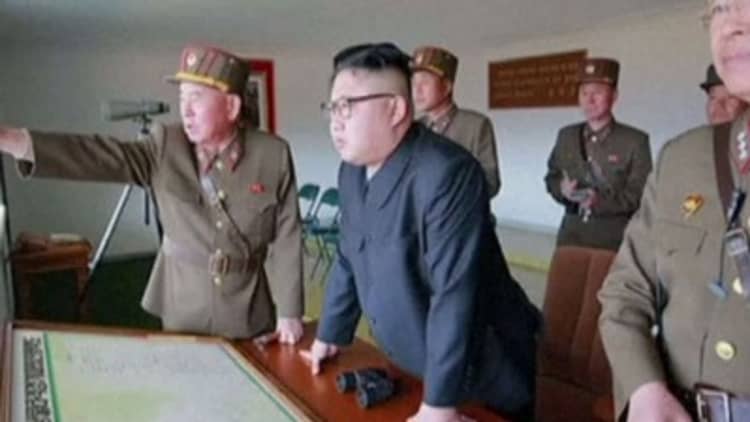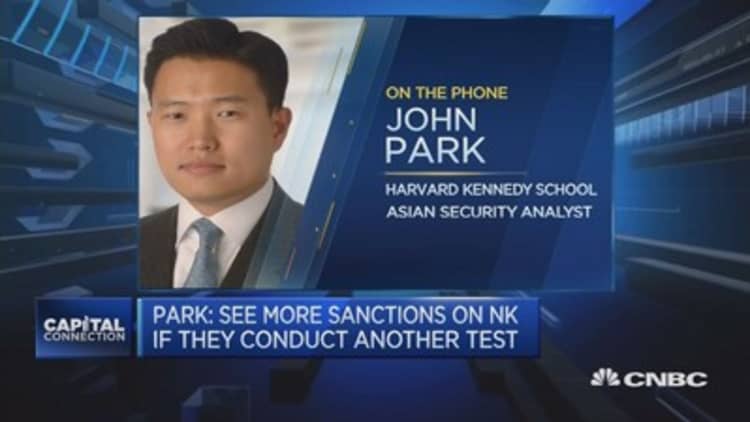While it's an intense couple of days for markets, several political analysts say North Korea will likely not cross a red line as the U.S. and China find a way to step up economic and military pressure on the nuclear threat.
"At the moment we're not expecting full-on conflict because this doesn't really benefit the North Koreans or anyone around the region," said Anwita Basu, lead analyst on Indonesia, the Philippines and North Korea for the Economist Intelligence Unit.
"The Chinese will take action to rein in North Korea before they allow it to escalate into a full-on war situation," Basu said.

The posturing by all sides is heating up ahead of a major North Korean holiday this weekend. The country celebrates the birthday of its founding dictator Kim Il Sung on April 15. State media warned the U.S. Tuesday of a nuclear attack at any sign of American aggression. Meanwhile, a U.S. Navy strike group is en route towards the western Pacific.
In preparation for potential conflict, hedge funds have bought protection against a South Korean default. South Korea's five-year-default swap jumped to $55.59 on Tuesday and rose Thursday to $58.97, its highest since late June last year.
South Korea 5-year credit default swap (12-month performance)
Source: Reuters
Ultimately, the fear is that North Korea could send a nuclear weapon as far as the U.S. But analysts say it's unclear whether the small country has the capability yet.
If it comes to a show of strength this weekend with a nuclear test, the first reaction will likely be economic sanctions by the U.S., South Korea, Japan and China, John Park, director of the Korea Working Group at the Harvard Kennedy School, said in an email.
The majority of North Korea's trade is with China, giving Beijing some leverage over the small nation. China suspended coal imports from North Korea earlier this year.
For China, "their bottom line is they don't want regime change in North Korea unless it's something they can very carefully manage. They don't want to have to clean up the mess with the collapse of the North Korean state," said Isaac Stone Fish, senior fellow at Asia Society's Center on U.S.-China Relations. Fish believes that North Korea's leader Kim Jong Un "is acting rationally" and is "playing a very sophisticated game of brinksmanship."
Beijing has advocated for maintaining a calmer status quo in its tense triangle of relations with North Korea, the U.S. and American allies South Korea and Japan.
On Thursday, Chinese Foreign Minister Wang Yi told reporters in Beijing that "military force cannot resolve the issue" and that "whoever provokes the situation … will have to assume historical responsibility."
"We'll know if the PRC leadership is serious when we see reports of Beijing actually cutting off the supply of refined oil products into the DPRK," Park said, referring to China and North Korea by their official names.
"With no refining capabilities, the DPRK is highly dependent on the PRC for its primary energy needs," Park said. "The DPRK would grind to a halt."
Meanwhile, the U.S. has deployed a missile defense system in South Korea. The U.S. Navy strike group and Japan's navy will also attempt to take down any North Korean missiles, Park said.
U.S. President Donald Trump tweeted Thursday that he has "great confidence that China will properly deal with North Korea" and said in a tweet Wednesday that he had a "very good call" with the President of China on "the menace of North Korea."
Trump, however, reversed many of his key positions on Wednesday and remains an uncertainty.
"It leaves us and others very much in doubt with what Washington is likely to do," said Donald Straszheim, head of China research at Evercore ISI. "This is stuff that's spooky, dangerous and the future is not knowable."
"In as much as it potentially involves the use of weapons of mass destruction, it's hard to overstate just how important it is," he said. "We're talking about nuclear weapons here. We're not talking about something less than that."
Watch: North Korea's next step



